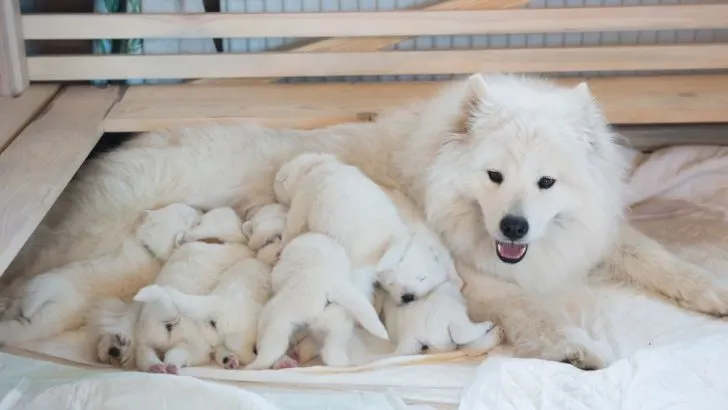Why do dogs eat their puppies? It’s a question that might sound strange and upsetting.
You might wonder why a dog mom would ever do something like this to her babies.
The truth is, while it’s not common, it does happen sometimes because of nature and health reasons.
Let’s talk about why these dog moms might do this, and look into the main reasons behind this puzzling behavior.
Canine Maternal Behavior As The Main Reason Why Dogs Eat Their Puppies
Before we get into all of it, we first have to understand that this disturbing behavior is natural. It may not be normal, but it can sometimes happen.
Maternal behavior is all about a dog’s natural instincts and inherited traits. These mother’s instincts have been passed down through doggie generations, ensuring pups survive in the wild.
When she becomes a mother, our super mom dog knows just what to do: keeping her puppies warm, safe, and well-fed.
Now, this protective and natural behavior can sometimes take an unexpected turn. And yes, this means eating her puppies. But, it can still be understood as ”protective behavior”. Why?
Well, if a mother dog senses illness, she may eat her newborn puppies to protect the other littermates from getting sick. That is one example.
However, there are various factors that are intertwined in this behavior, such as stress, environmental influences, inexperience, and so on.
1. Nutritional Stress In Mom Dogs
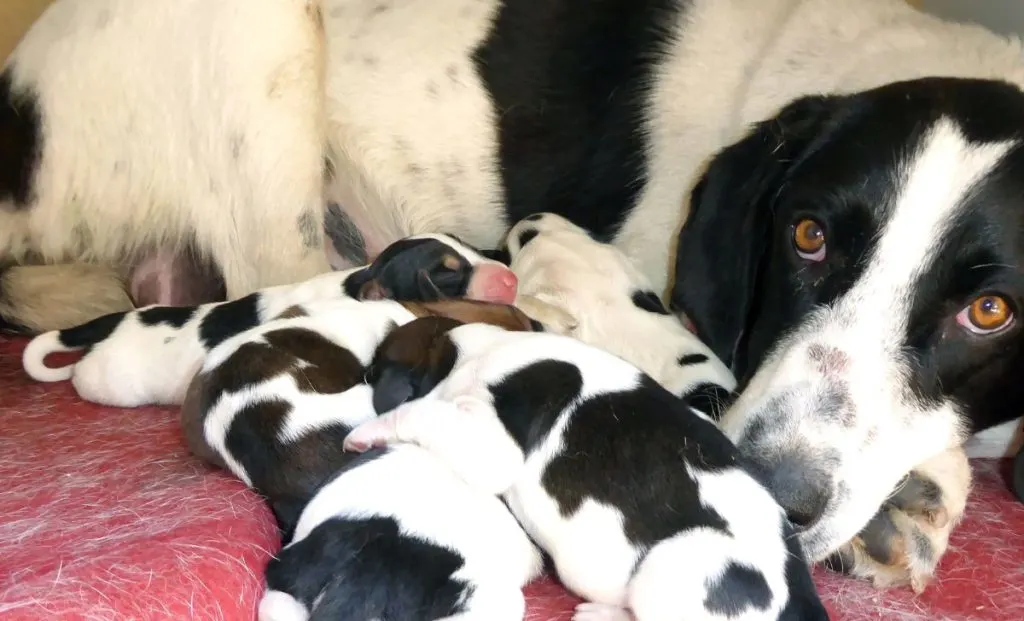
The exact cause of nutritional stress in mom dogs typically comes from inadequate dietary intake or imbalances during pregnancy and lactation.
For example, if a mom dog doesn’t get enough protein in her diet, she might have trouble making milk and helping her puppies grow.
In most mammals (including our beloved dogs), deficiencies in vitamins and minerals such as calcium, phosphorus, or vitamin D can lead to skeletal issues in both the mother and her puppies.
Imbalances in fats and carbohydrates may also affect energy levels and overall health.
In some situations where the mother is lacking essential nutrients due to poor diet or inadequate care during pregnancy and lactation, she may perceive even her puppies or poop as a source of food.
This significant stress can stem from a lack of essential nutrients crucial for the mother’s health and the development of her puppies.
Without proper nutrition, mom dogs may struggle to meet the demands of pregnancy and nursing, leading to compromised health for both her and her litter.
2. Unhealthy Pups
When a mix of breeds in a litter leads to newborn pups, everyone hopes they’ll all be healthy. But sometimes, a sick sibling among the pups can make things tough. Purebred litters are not excluded.
This behavior, known as canine cannibalism or infanticide, can occur in various species, including dogs, although it’s not common.
Eating unhealthy pups might seem harsh, but there are several ‘’rational’’ reasons why this might happen. Although rare, there is quite some evidence of dogs doing this.
For example, mother’s instincts to remove weak or sickly offspring to focus her resources on the survival of the healthier ones.
This canine behavior can also be due to genetic predispositions or environmental factors, such as inadequate prenatal care or poor nutrition.
In some rare and unfortunate cases, unhealthy pups may be vulnerable to being eaten by their mother or even their healthy littermates.
An interesting study investigated why some mother dogs might eat their puppies, linking the behavior to their hormone and fat levels.
It found that mothers who had done this had lower levels of the hormone oxytocin, which is important for motherly behaviors, and different fat levels in their blood.
This suggests that these imbalances could lead to such rare and sad behaviors in mother dogs
3. Hormonal Imbalances Postpartum

Hormonal imbalances post-partum can affect a dog’s behavior in various ways, potentially leading to the maternal behavior such as eating her little ones.
In all dogs, especially females, hormonal changes occur throughout their life stages. They are biological factors that influence various aspects of their behavior, reproduction, and overall health.
Prolactin
After giving birth, female dogs experience a surge in prolactin, stimulating milk production to nourish their puppies.
If the mother does not end up with enough nutritional values to stimulate milk production for the nourishment of her litter, she may resort to eating her puppies as a way of replenishing needed nutrition.
Cortisol And Adrenaline
Just like humans, dogs produce stress hormones like cortisol and adrenaline in response to various stimuli. This includes environmental stress, physical discomfort, or perceived threats.
These stress hormones, coupled with the stress of birth, can impact the female dog’s behavior and well-being post-partum.
When the mother dog is experiencing extreme stress, anxiety, or fear, these hormones are elevated. She then may engage in abnormal behaviors like cannibalism as a coping mechanism.
4. Inexperienced Mothers
It is not uncommon for a new mom, especially an inexperienced mother dog to face challenges in caring for their newborn puppies.
Despite their best intentions, accidental harm can occur due to lack of experience or understanding of proper maternal behavior.
These inexperienced mother dogs may struggle to meet the constant needs of their puppies, leading to difficulties in providing care and attention.
And if you thought when your dog turned their bum towards you was too much, you don’t want to see what the puppies get.
Inexperienced mother dogs can accidentally step on or squish a pup, not noticing its distress signals.
This could also happen if they feel overly stressed or confused, mistaking their puppies for something else in their uncertainty.
While grooming her puppies, a mother dog may inadvertently bite their paws, especially if she’s a first-time mom.
This behavior is typically not meant to cause harm but can happen due to the mother’s unfamiliarity with the delicate nature of her puppies’ bodies. As she licks and nibbles to clean her pups, she may occasionally apply too much pressure or lose control over her bite.
While it may seem alarming, these incidents are usually harmless if the pup is big enough. In other occasions this may lead to the puppy being eaten due to lack of experience.
5. Environmental Influences
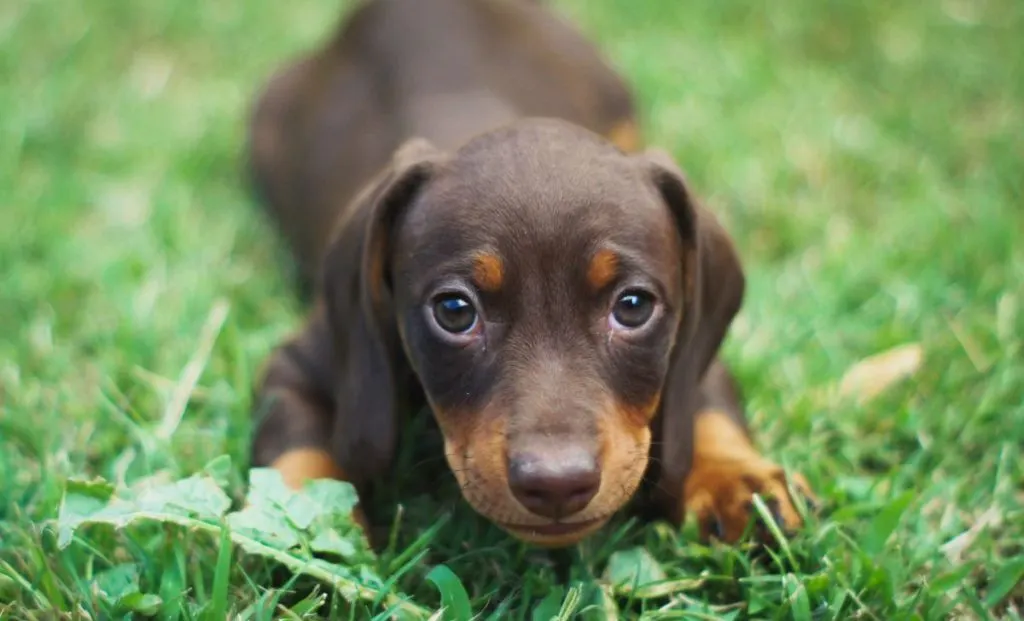
Generally, environmental influences play a crucial role in shaping a dog’s behavior and overall well-being. Now, for a mother dog and her puppies, these influences are amplified tenfold.
The home environment can greatly significantly impact a mother dog’s stress levels and behavior. For example, the presence of external threats (this can be another dog/pet) and new people.
Female dogs exposed to environmental stress, such as loud noises, unfamiliar animals, or overcrowded environments, may exhibit signs of anxiety or aggression.
Instead of nurturing and caring for her puppies, she may become agitated, confused, or overwhelmed, leading to abnormal behaviors like eating one of her pups. This is, however, very rare.
It is also important to note that in overcrowded or stressful environments, some dogs may exhibit this type of behavior. Moreover, overcrowded spaces increase the risk of disease transmission among the pups and the mom.
Therefore, during this period, dog owners must provide better conditions for the momma dog and minimize external threats.
6. Psychological Aspects
As we have previously mentioned, stress and anxiety can affect a mother dog’s behavior.
For example, when dogs aren’t treated well by their owners, stress and anxiety can creep in. Lack of care and negative experiences can then leave them feeling lonely, scared, and insecure.
This can lead to behavior problems like aggression or excessive barking, neglecting maternal duties or even eating her pups.
7. Medical Conditions And Pain
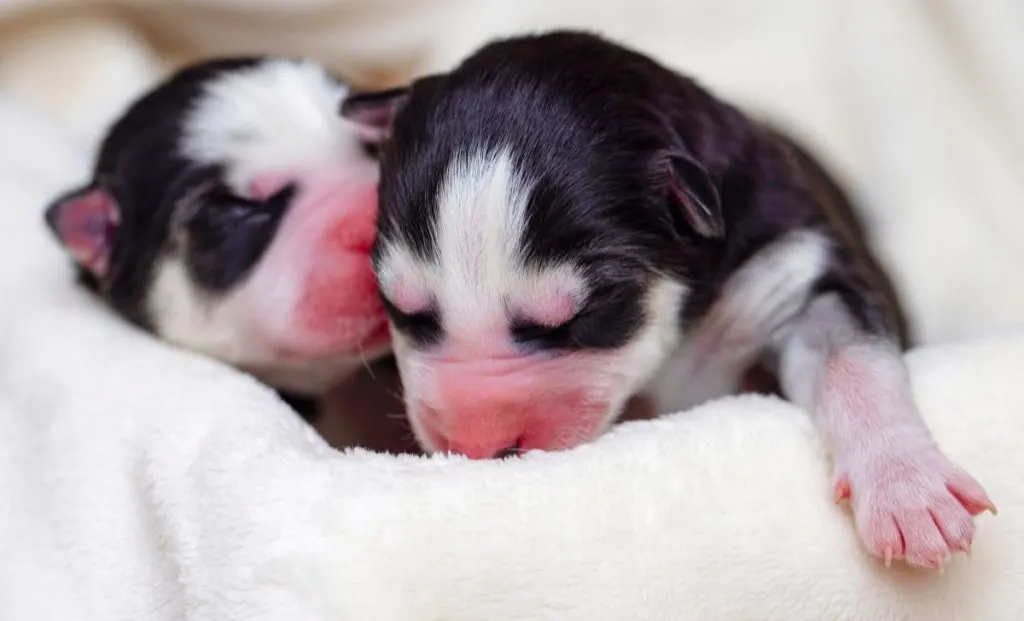
Some medical conditions postpartum can cause a female dog to feel discomfort, pain, and stress.
For example, mastitis is when a dog’s mammary glands get inflamed. This often happens during the time she’s nursing her puppies.
When a female dog has many puppies, her mammary glands can become especially sore and overwhelmed due to the constant need for milk.
You can imagine how this excessive nursing can then lead to increased sensitivity and pain in the mammary glands. Such pain can make the mother dog more irritable and potentially disrupt her natural nurturing behavior.
Mastitis isn’t the only reason that could have an effect on maternal behavior.
Sometimes, after having surgery like a cesarean section to deliver her puppies, a mom dog can feel a lot of pain and stress.
This discomfort might change the way she acts, sometimes leading her to not treat her puppies right, and in rare cases, even eat them.
Do Dogs Reject Their Puppies If You Touch Them?
You have probably heard about this question/statement before.
This belief is widespread among pet owners, but scientific research specifically addressing this issue appears to be lacking in the current academic literature.
However, some pet parents claim that mom dogs may start rejecting their newborn puppies if they are touched too much by humans.
This reaction can occur because too much handling may interfere with the mother’s bonding process with her puppies or disrupt their natural scent. This may cause confusion or distress to the poor mom.
It may not be about the scent; It could have more to do with humans interfering with these delicate moments and causing stress to the mother dog and her pups.
However, it is important to note that not all dogs will reject their puppies due to human handling. Many dogs are tolerant and accepting of human interaction with their newborns.
Why Do Mother Dogs Keep The Father Away?
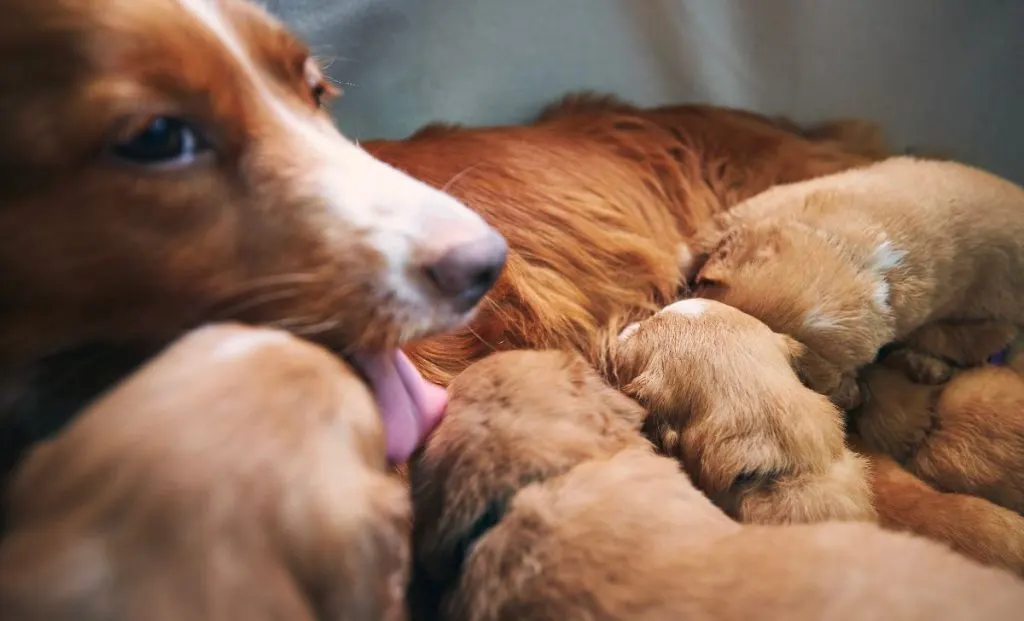
A mom dog is just trying to make sure their puppies are safe and have everything they need! She may often keep the father away from her puppies as a result of her protective instincts.
In natural settings, it’s typical for mother dogs to create a protective boundary around their own offspring. This prevents potential dangers, including the father, from approaching.
Observing my neighbor’s dog, a female Belgian Malinois, you could see her being more protective than the male one. But she has never shown anger towards her babies (until they got a bit older).
While not exactly having the same maternal behavior as Belgian Malinois, some dog owners noted that female American Bully can act aggressively a bit more under certain influences (male dog present near her puppies).
The female dog seems to take her job as a protector extra seriously and will take extreme measures. She is always on high alert for any potential threats.
In contrast, the male was more laid-back and easygoing, showing less inclination towards guarding.
That said, the male dog’s involvement in parenting is typically minimal compared to the mother’s role. I mean, don’t expect them to start changing diapers anytime soon!
Additionally, having the father dog near the puppies could pose a risk of accidental harm, as he may lack the same protective instincts as the mother.
Limiting the father’s access allows the mother to focus on caring for her puppies without distractions or interruptions.
But hey, even though he might not be the cuddly, nurturing type, his presence alone can add a sense of security to the pack. That’s something!
Does A Father Dog Know His Puppies?
When it comes to recognizing their puppies, male dogs might not always have the same instinctual connection as mother dogs do, but they do have ways of knowing their own.
Dogs have an incredible sense of smell that helps them recognize individuals, including their own puppies.
They use their keen noses to distinguish between different people, and this skill likely extends to identifying their offspring, too.
While we often see mother dogs taking the lead in caring for their puppies, this ability suggests that father dogs might also be able to recognize their little ones through scent and possibly visual cues.
What Are Bad Signs After A Dog Gives Birth?
If you thought that a dog eating its puppies was a bad sign after birth, I regret to inform you that there can be more.
While most births proceed smoothly, there are rare instances where intervention may be necessary.
In the first place, I cannot stress enough how important it is to monitor a mother dog after she gives birth. Be on the lookout for any signs of complications or health issues.
Here are some signs that you should get a veterinarian involved right away:
- Decreased appetite
- Weak or distressed puppies
- Lethargy
- Foul vaginal discharge
- Change in color of vaginal discharge
- Unusual behavior
- Excessive bleeding
If you notice any of these bad signs, I advise you to seek out immediate veterinary attention.
Should I Stop My Dog From Eating Her Puppies?
In difficult situations like these, human intervention may seem necessary. Therefore, it’s important to intervene carefully. Gently separate her from the puppies to prevent any harm.
After separating them, make sure to talk to a veterinarian to check if there’s a health issue causing this behavior.
You can also help by making sure the dog’s environment is quiet and comfortable to lower her stress.
Sometimes, giving her a toy or something else to focus on can stop her from acting out.
The most important thing is that you keep an eye on her when she’s with her puppies. Watch for any signs of trouble.
Feed her a good, nutritious diet, especially if she’s nursing. Do not hesitate to use some dietary supplements, but first consult with your vet.
If these steps don’t help, and the dog keeps attempting to eat her puppies, a dog trainer or behavior expert might offer more advice.

Meet Iram, a devoted veterinarian, passionate dog lover, and current Ph.D. candidate at Utrecht University in the Netherlands. Seamlessly blending her roles as a vet and content writer, Iram channels her love for dogs into heartfelt narratives.
Since childhood, Iram nurtured a dream of becoming a vet, a passion that runs deep in her family. Having now fulfilled that dream, she’s eager to share her acquired knowledge. In her writing, Iram not only explores the emotional bond between humans and their canine friends but also integrates her veterinary expertise, offering readers a holistic understanding of their beloved pets.
